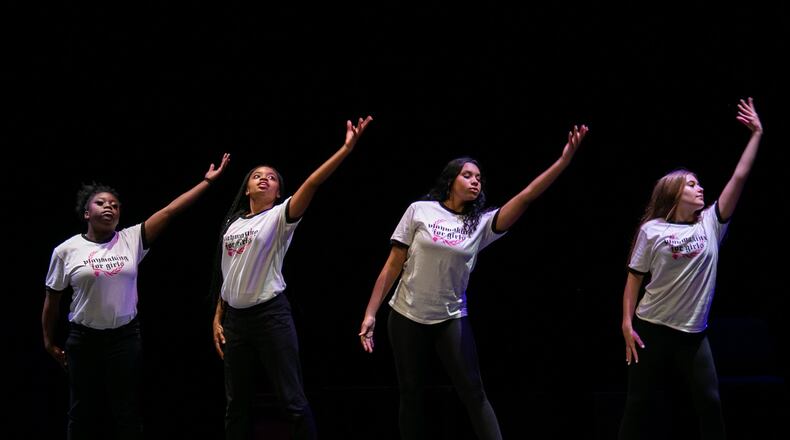Synchronicity Theatre’s Playmaking for Girls program leans into that belief that the arts can change the trajectory of someone’s life. The annual program gives what Synchronicity calls “at-hope” teens the opportunity to find creative, impactful ways to tell their stories.
This year’s group of teen girls will convey their stories onstage at a free performance on Saturday, June 17, at Georgia State University’s Marvin Cole Auditorium in Clarkston.
Playmaking for Girls began in 2002 when Atlanta’s Synchronicity Theatre partnered with the Wholistic Stress Control Institute to organize a workshop with 30 young women at a regional youth detention center. The purpose of the workshop was to prepare the actors of Synchronicity’s then-upcoming production of Kia Corthron’s “Breath, Boom.” However, the workshop received such positive feedback that it turned into an ongoing program serving teenage girls across the Atlanta area.
In 2004, the first Playmaking for Girls public performance was produced.
The program works with teenage girls who live in group homes, are wards of the state or are refugees. Throughout the year, they participate in workshops where they write, rehearse and perform plays based on their own experiences. Once a year, a few of these plays are selected for a public performance, complete with professional production.
The performance is followed by an open session where audience members can discuss their reactions to the performance and speak directly with the girls. Program director Susie Purcell said the after-performance sessions are a significant part of the event.
The girls “shine brightly because so many people are present and are interested in each of them,” she said. “Witnessing them feeling heard and cared for by primarily complete strangers is beautiful. This isn’t something that they are used to feeling.”
Over the years, Playmaking for Girls has given young women the chance to empower themselves through storytelling. Several participants spoke of the joy they felt at learning to act and write, as well as the power of seeing stories like theirs play out onstage. Many have also discovered that they can process their emotions through theater.
“It helped me with anxiety the most,” one said. “When you’re anxious, you can like write your feelings out on the play.”
“When I write my stories,” said another, “I put my own situation into my story. What I go through or what anyone else feels — I put that into my writing. It makes me happy to see somebody else going through what I go through.”
Because the girls are often writing about heavy subjects, including abuse, body image, homelessness and even war, the Playmaking for Girls team works hard to create an atmosphere for the girls to explore these issues safely.
“While this work is emotional and very therapeutic, we also know that we are not therapists and that our use of drama and playwriting is not formal art therapy,” Purcell said. “So we use the theater games, exercises and writing process as an acting-playwriting workshop space.”
They also lean on professionals, such as licensed therapists, social workers and experts on refugee populations, to provide trauma-informed training to the staff.
The performers are hoping that the public wants to hear about their lives and come to Saturday’s event.
“Maybe you might learn a couple of things from this play,” one said. “The things that you learn from each individual play you see might help you with some things that you’re going through.”
Added another: “I would say go cause I’m going, and I know it’s going to be big. It’s going to be fun. You’re going to get to meet a lot of great people that you thought you would never meet.”
These sentiments are echoed by the artists and academics who have been drawn to the program. Maisha Winn’s book, “Girl Time: Literacy, Justice, and the School-to-Prison Pipeline,” uses Playmaking for Girls as its primary case study. The book, published in 2011, explores the benefits of literary and creative outlets for incarcerated girls.
“Witnessing the process of empowerment in these girls has been so powerful,” Purcell said. “My life has been enriched by watching young teens who felt hopeless and abandoned start to feel empowered to speak, explore the power of storytelling, learn to use their literal voices and write plays.”
THEATER PREVIEW
Playmaking for Girls
6:30 p.m. Saturday, June 17. Free but reservations required. Marvin Cole Auditorium, Georgia State University Clarkston campus, 3735 Memorial College Ave., Clarkston. 404-484-8636, synchrotheatre.com.
About the Author
Keep Reading
The Latest
Featured


